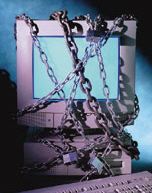National Security

Surveillance/Regulation Software
• The United States, in conjunction with Canada, Australia, New Zealand, and Great Britain, created the ECHELON program to monitor worldwide telephone and e-mail interaction. ECHELON works by scanning messages for keywords that appear in communications.
• There is an annual international cooperative effort made to jam ECHELON as a way of proving the existence of the secret system. Internet users send mass e-mail messages with such phrases as “NSA,” “terrorism,” and “bomb.” However, since the governments never acknowledge the campaign, it is never determined whether the efforts are actually successful.

Situations of International Government Regulation
• UN Governance of the Internet
In March 2004, the United Nations hosted the Global Forum on Internet Governance, and Secretary General Kofi Annan announced that he intended to create a committee that would investigate the feasibility of UN governance of the Internet.• Commercial and Government Interests in Cybersecurity
Microsoft CEO Steve Ballmer argues that everyone is responsible for cybersecurity. While highlighting his company’s security initiatives in a speech given in Washington, DC, Ballmer emphasized cooperation between the commercial and political sectors.
• Internet control and disconnection in Haiti to influence political situation
In November 1999, the Haitian government disconnected Alpha Network Communications, the island’s largest Internet service provider. Nearly 80% of Haitian Internet users lost access in what critics viewed as “an attempt by the government to silence dissent and consolidate power” before national elections in 2000.

• Ratings system in Australia
In the past, Australia has attempted to restrict access to certain Internet content via the Broadcast Services Amendment (Online Services) Act. The proposed legislation is based on the ratings system that Australia uses for films. Electronic Frontiers Australia is just one organization protesting the legislation.• INCORE project
European countries have also proposed legislation for Internet content regulation. The INCORE (Internet Content Rating for Europe) project is sponsored by the European Union and is attempting to generate “a generic rating and filtering system suitable for European users.” INCORE’s critics maintain that the both the public and ISPs cannot be forced to use content controls.